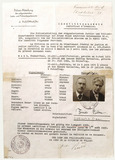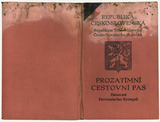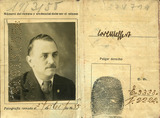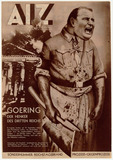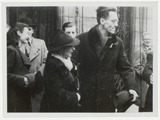Passport from the Czechoslovakian Republic for John Heartfield (1938)
Passport from the Czechoslovakian Republic for John Heartfield (1938)
Sie bürgern nicht nur jeden in ihre Konzentrationshöllen ein, der nur leise wagt, den Mund gegen sie zu öffnen. Sie – bürgern auch aus! Sie trachten so, die ihrem blutigen Arm bisher entronnen sind, zu treffen, sie erklären sie so für vogelfrei.
[They are not only making anyone who dares to open his mouth to any extent ‘inhabitants’ of their concentration infernos. They are also expatriating people. They have such a strong desire to encounter those who have until now escaped their bloody clutches that they use expatriation to declare them fugitives. (ed. trans.)]
John Heartfield in the Prague exile newspaper Gegenangriff [Counter-Attack] from 28 November 1934
The communist graphic artist John Heartfield was able to leave Prague for Great Britain with his Czechoslovak passport at the last minute in 1938. In the spring of 1933, Heartfield had fled from Germany to exile in Prague, where he worked mainly for the Arbeiter-Illustrierte-Zeitung (AIZ) and the communist publishing house Malik-Verlag. Even in Prague, the leadership of the Nazi Party had attempted to use the Gestapo and the German Embassy to thwart Heartfield's work. Under the direction of Goebbels, the German press led a campaign of against the magazine AIZ [Workers Pictorial Newspaper, 1921-1938]. Heartfield and his friends were spied on, and one of his exhibitions in Prague was closed under pressure from the German government.
In September of 1934, John Heartfield, his brother Wieland Herzfelde and artists including Heinrich Mann, Alfred Kerr and Erwin Piscator signed an exhortation to the people of the Saarland to vote against the imminent annexation of the territory into the German Reich. The Nazi government subsequently revoked citizenship from all who signed the declaration. In 1938, the Gestapo began intensifying its attempts to have the Czech police arrest Heartfield, who was a fugitive in Germany. Following the passage of the Munich Agreement and the occupation of the Sudetenland, the Nazis came dangerously close to the expatriates living in exile in Prague. Their only chance was to flee yet again.


